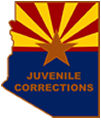Information For New Parents
Why is my child staying more than 30 days if the judge gave them a minimum of 30 days?
- 30 days is the minimum your child can stay but our treatment program is of 6 months or more depending on his/her behavior and passing all of his/her classes in Education. Our core treatment modality, which is a skill building modality and taught in every unit is called Dialectical Behavior Therapy (DBT). It takes 6 months to complete all DBT modules.
- See Family Handbook - Page 5.
Response
How long will my child be at Adobe?
- Our program is 6 1/3 months to complete, if the judge gives them a longer minimum then they will be here until at least that time.
- See Family Handbook - Page ??
Response
How often can they move up in their phases?
- Phase progression is not tied to a timeframe, but rather your child's ability to learn, implement and display the skills they have learned in each phase. Obviously there is a time component as it does take time to move through the Dialectical Behavior Treatment (DBT) modules, but simply attending a group does not mean that your child understands and has the ability to implement the skill. The Multi-Disciplinary Team (MDT) reviews youth weekly at their team meetings. They make decisions on youth ability to promote at these meetings. Area that are considered include, education, behavior and progress in treatment (both groups and individual with PSA).
- See Family Handbook - Page 19
Response
How do the phases work?
- Your child will work through five phases prior to having a Juvenile Community Re-Entry Board (JCRB) scheduled. They will need to meet behavioral, educational and treatment criteria in order to earn their next phase. As your child learns and gains proficiency with new skills, they will need to display incrementally more of an ability to utilize and implement the skills they have learned at AMS. Your child's Multi-Disciplinary Team (MDT) will determine when he or she is eligible to promote to the next Phase. It will take a minimum of six months for your child to work through all phases and earn a JCRB due to the fact that the core treatment modality Dialectical Behavior Therapy (DBT) takes six months to complete.
- See Family Handbook - Page 21
Response
Can I bring him food when I visit?
- No, we having vending machines here where you can purchase food and drinks.
- See Family Handbook - Page 51
Response
How much money can I bring to visitation?
- One Dollar and Five Dollar Bills and credit/ debit cards.
- See Family Handbook - Page ??
Response
Who can visit?
- While on the Intake unit (Challenge for boys, Quest for girls) only parents and legal guardians are able to visit. Once your child moves to their permanent unit they are able to add other family once the Parole Officer approves.
- See Family Handbook - Page 50
Response
Is there a dress code for visitation?
- Yes. Required Attire:
- Closed-toe and closed-back shoes;
- Shirts with sleeves or cap sleeves;
- Jeans are permitted, but ensure there are no holes or tears; and
- Any tattoos with sexually explicit or gang-related content must be covered.
- Prohibited Attire:
- Exercise clothing or any bottoms that end above the knee;
- Open-toed or open-back shoes, or shoes with heels larger than 2 inches;
- See-through or sheer clothing, and clothing that exposes undergarments;
- Muscle shirts, spaghetti strap shirts, sleeveless tops, tank tops, or bodysuits;
- Clothing, jewelry, accessories, or styles that promote gang affiliation, sex, violence, alcohol, drugs, guns, daggers, or other weapons;
- Jeans, pants, or shorts with holes or tears; and
- Clothing that exposes cleavage.
- You will receive a copy from your Case Manager via email.
- See Family Handbook - Page 51
Response

